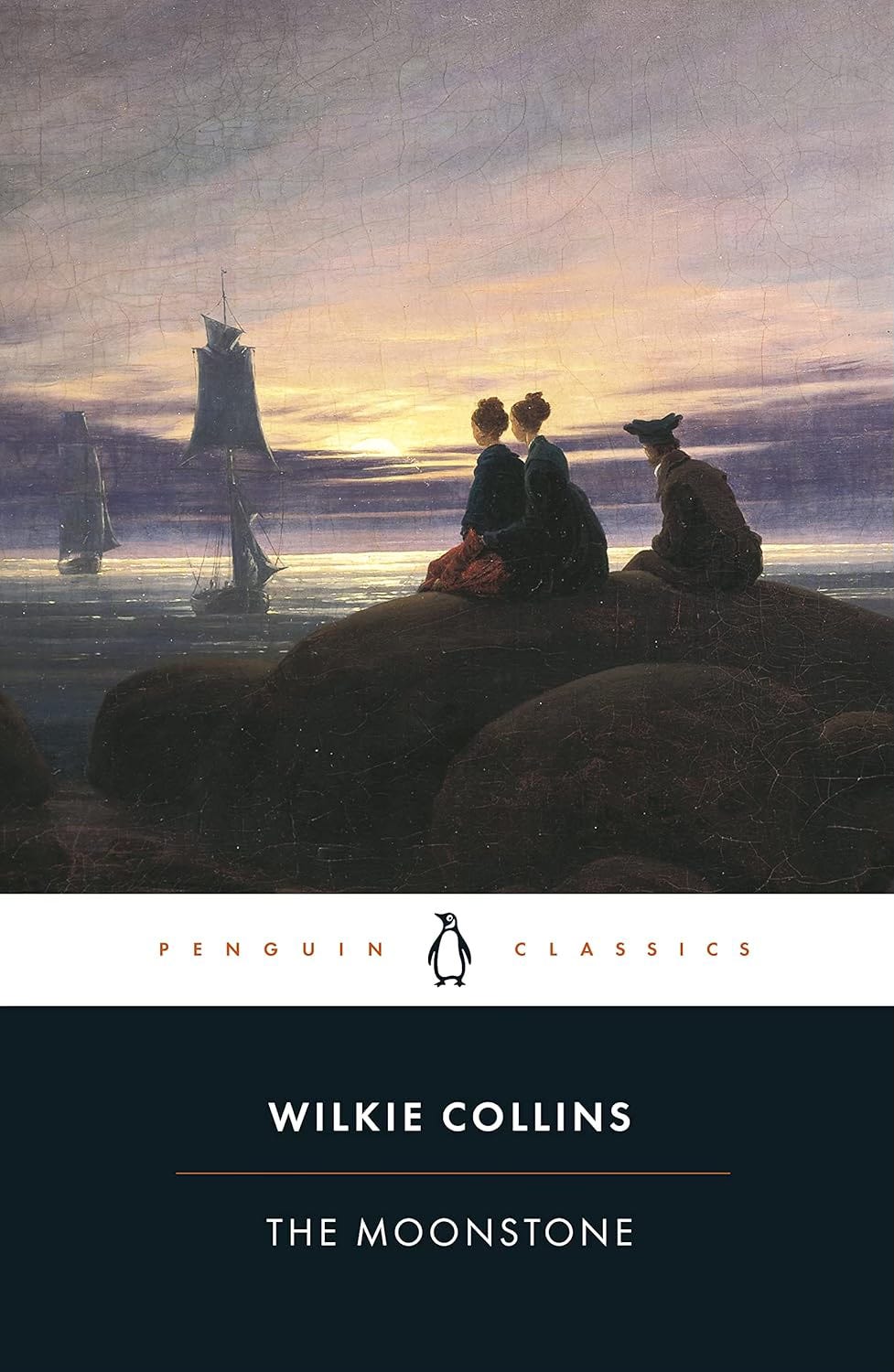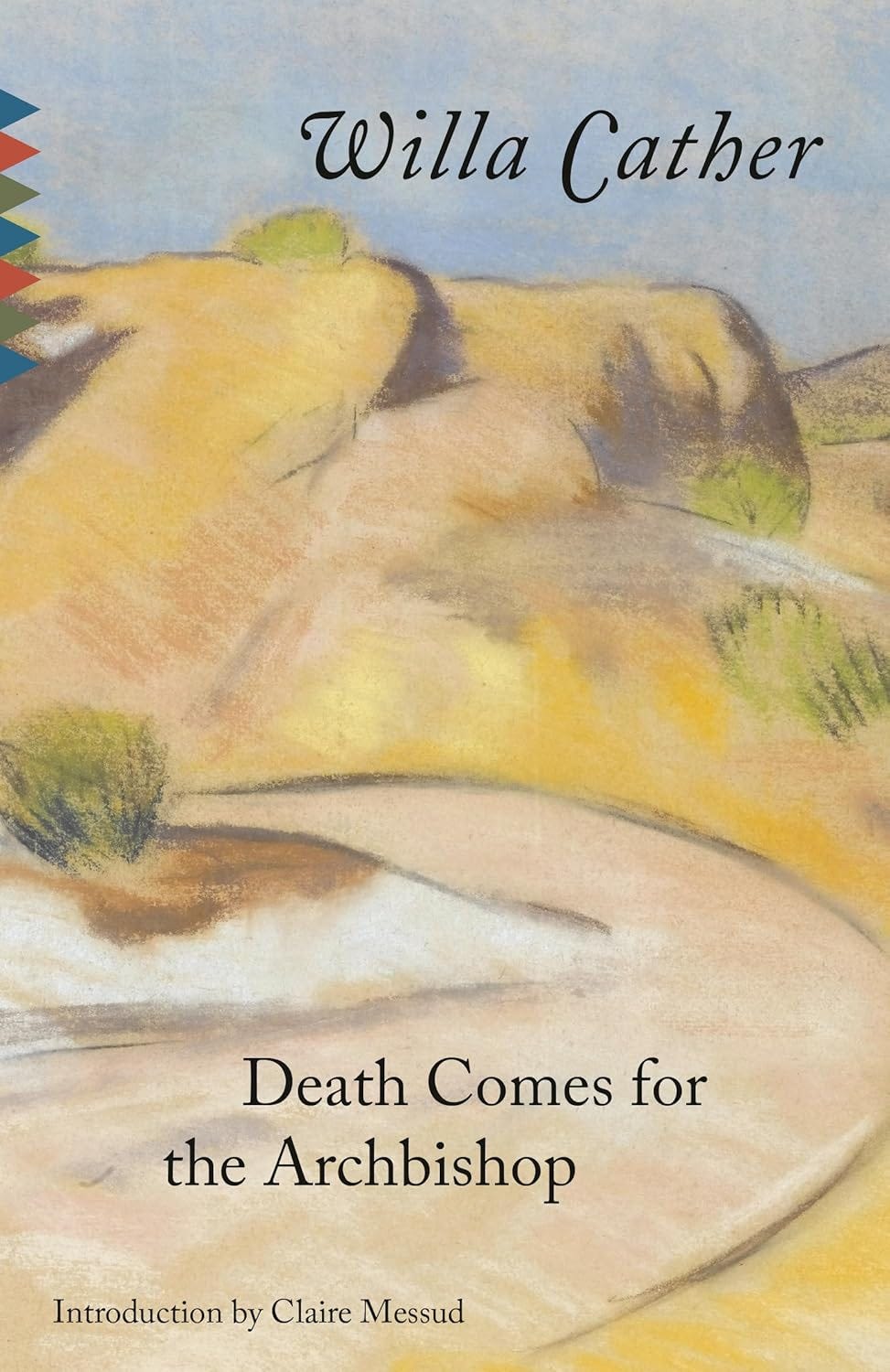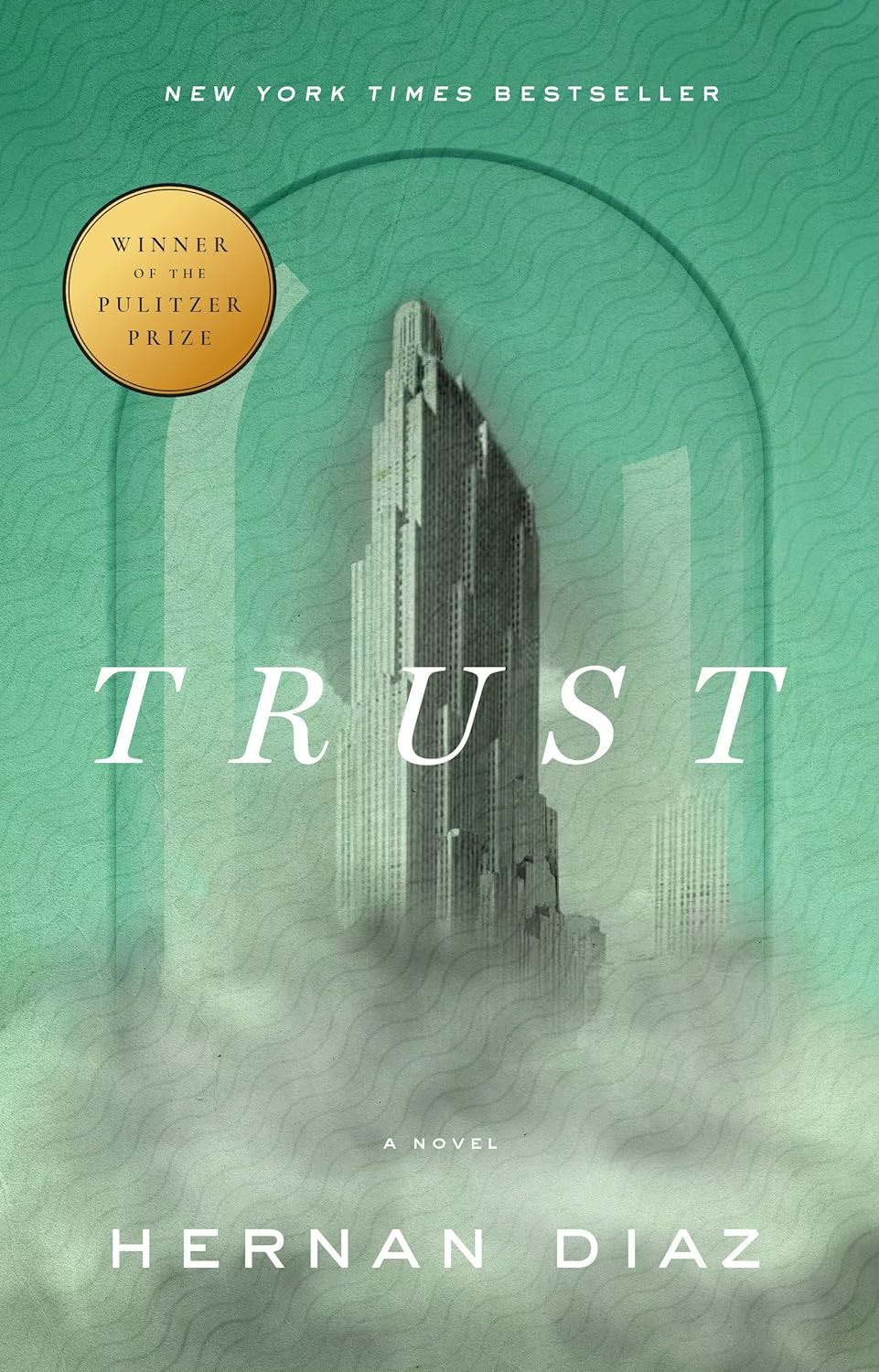The Moonstone Revisited: Section 3
2nd Period: First Narrative, ch 6 - 2nd Period: Third Narrative, ch. 7
Welcome to Reading Revisited, a place for friends to enjoy some good old-fashioned book chat while revisiting the truth, beauty, and goodness we’ve found in our favorite books.
Happy April, readers!
We have certainly ended this reading section on a cliffhanger, so let’s get right into it!
As we dive in to these chapters, I’ll first point out that this week’s reading section felt a bit differently paced than previous ones. Partly this may be due to the constant movement. Nobody is staying put. I’ll give a quick recap so we can keep everything straight: we open with Miss Clack and Rachel in London preparing for a removal to Brighton. After just a short time in Brighton, Rachel is back in London at Mr. Bruff’s home for a time, before being settled at the home of her aunt Merridew. We also catch up with Franklin Blake who has been “wandering in the East”. Upon learning of his father’s death, he comes back to London, but quickly departs for Yorkshire back to the Verinder home to try to uncover the mystery of Rachel’s coldness towards him. After a short, but revealing, stint in the country, Franklin is rushing back to the city, and we end with everyone back in London.
We also have many different narrative voices coming in and out here. These varying voices, for me, keep the story moving along nicely - most especially Rosanna’s message “from the grave” as it were, but also keeps readers on our toes as we’re trying to follow the story and make right judgements.
Some Themes & Quotes
The themes that stood out to me in this week’s reading largely follow what we’ve been tracking from last section, so I enjoyed seeing how these continue to play out.
Appearances
First, let us indulge in a collective sigh of relief that Rachel’s impending doom marriage to Godfrey is off the table. Our suspicions have been justified and he turns out to be a money-hungry suitor who is all too happy to part ways with Rachel upon learning the true state of her financial position. Though Rachel has avoided falling into his trap, we’re not entirely satisfied with the conclusion, because the appearance of the situation still lands in Godfrey’s favor.
The tense scene in chapter eight where things come to a head with the Ablewhites probably gives a good indication of how society at large will view the situation:
“it’s your sovereign will and pleasure, Miss Verinder, to jilt my son?…I know your motive, Miss Verinder, for breaking your promise to my son! I know it as certainly as if you had confessed it in so many words. Your cursed family pride is insulting Godfrey, as it insulted me when I married your aunt” (second period, first narrative, ch 8).
Once we have all of the facts, we find Rachel again refusing to disclose all of the information at her disposal. This time, however, we have the motive:
“How can I tell him [Godfrey] he is mean, how can I tell him he has deceived me, how can I disgrace him in the eyes of the world after that? I have degraded myself by ever thinking of him as my husband…the shame of it would be unendurable to me” (second period, second narrative, ch 1).
The similarity of her position in this situation to that of her connection to the Moonstone is striking. Mr. Bruff notes:
“Here was her sensitive horror of the bare contact with anything mean, blinding her to every consideration of what she owed herself, hurrying her into a false position which might compromise her in the estimation of all her friends!” (second period, second narrative, ch 1)
Slowly but surely, we are seeing more of Rachel’s character unfold. In the case of Godfrey, pride compels her to accept the false appearance of malice that will inevitably be attributed to her rather than admit that she had been deceived. I’m keeping this in mind as we wait to see how Rachel’s connection with the Diamond comes to light.
As we get into the third narrative, the puzzling discovery of Franklin’s apparent connection with the Diamond’s disappearance is both shocking and confusing. The biggest question we’re left with is whether Franklin is to be trusted. Appearances are CLEARLY against him, especially if we trust Rachel’s testimony, but if we’ve seen anything thus far in the story we’ve seen that appearances cannot always be trusted.
Men and Women
We’ve seen LOTS more references, direct and indirect, to the men vs. women theme in this section.
One thing I’m noticing here is how often men and women are misunderstanding each other. This idea hearkens back to the first section when Betteredge, sage philosopher that he is, said of his own brief marriage:
“How it was I don’t understand, but we always seemed to be getting, with the best of motives, in one another’s way. When I wanted to go upstairs, there was my wife coming down; or when my wife wanted to go down, there I was coming up. That is married life, according to my experience of it” (first period, ch 2).
One misunderstanding here which resulted in tragedy was between Franklin and Rosanna:
“For her own sake, I had purposely shown no special interest in what was coming; for her own sake, I had purposely looked at the billiard balls, instead of looking at her - and what had been the result? I had sent her away from me, wounded to the heart!” (second period, third narrative, ch 5)
and then
“Again for the poor creature’s own sake, I had met the police-officer with a flat denial, and had declared - loudly declared…that I felt ‘no interest whatever in Rosanna Spearman.’ At those words, solely designed to warn her against attempting to gain my private ear, she had turned away and left the place: cautioned of her danger, as then I believed; self-doomed to destruction as I know now” (second period, third narrative, ch 5).
Mr. Bruff, when appealed upon by Franklin, to arrange a meeting between Rachel and himself, also humorously appeals to the difference between men and women when noting his wife and daughters’ lack of scruples regarding the set-up:
“But women, as you may have observed, have no principles. My family don’t feel my pangs of conscience” (second period, third narrative, ch 5).
This section ends with men and women at odds again.
It is not insignificant that Franklin enters Rachel’s presence (deceptively) through the garden. Their initial interaction makes it clear that despite all that has passed, their mutual love for each other endures, but despite the initial embrace, their communion is broken.
Rachel’s harsh word to Franklin shatter his hopes right out of the gate:
“You coward! You mean, miserable, heartless coward!” (second period, third narrative, ch 7)
Franklin considers these words to be “The most unendurable reproach that a woman can address to a man”.
Our section ends with Franklin again in the garden:
“I saw her, and heard her, no more” (second period, third narrative, ch 7)
Final Thoughts/Questions
First, I was struck by Betteredge’s warning in chapter two:
“Let the Diamond be, Mr Franklin! Take my advice, and let the Diamond be! That cursed Indian jewel has misguided everybody who has come near it. Don’t waste your money and your temper - in the fine spring time of your life, sir - by meddling with the Moonstone” (second period, third narrative, ch 2)
This quote hearkens back to the opening line of the first period, when Betteredge quotes Robinson Crusoe thus:
‘Now I saw, though too late, the Folly of beginning a Work before we count the Cost, and before we judge rightly of our own Strength to go through with it.’” (1st period, ch 1, p. 15)
Betteredge is right that the Diamond has led to discord amongst all involved, so I’m curious to see, as Franklin persists in pursuing the truth of the Diamond’s disappearance, what will be the cost?
Did this moment from chapter 3 remind anyone else of Jane Eyre in the Red Room?
”In this position, my face was within a few feet of the surface of the quicksand. The sight of it so near me, still disturbed at intervals by its hideous shivering fit, shook my nerves for the moment. A horrible fancy that the dead woman might appear on the scene of her suicide, to assist my search — an unutterable dread of seeing her rise through the heaving surface of the sand, and point to the place — forced itself into my mind and turned me cold in the warm sunlight” (second period, third narrative, ch 3)
Finally, I’m very interested in the character of Ezra Jennings, whom we quite briefly meet in chapter four. From Franklin’s description of him, we find that he seems to possess several “incongruities” in his person:
He appears young by his movements, old by his face and wrinkles
His dark complexion and his facial features make him appear Eastern, but he has the name and manner of a man of the West
His hair is half black, half white (piebald - flashback to Perelandra for anyone who read The Space Trilogy along with us these last few months!)
I’m anxious to learn more about him in the coming chapters…the way that our attention has been drawn to him makes me think he may play an important part in what’s to come.
Until next time, keep revisiting the good books that enrich your life and nourish your soul.
In Case You Missed It:
On the Podcast:
What We’re Reading Now/Next:
April
The Moonstone by Wilkie Collins
May
Death Comes for the Archbishop by Willa Cather
June
Trust by Hernan Diaz
A Few Reminders:
If you are wanting to get in on the in person or virtual community please contact us!
We have turned on paid subscriptions which will allow you to support the work we are doing here as well as receive Read Along Guide PDFs each month, voice recordings of the Read Along Guides and Essays, and we are working on (printable) bookmarks for each book.
If you would like to make a small contribution to the work we’re doing here at Reading Revisited, we invite you to do so with the Buy (Us) a Coffee button below. We so appreciate your support!
*As always, some of the links are affiliate links. If you don’t have the books yet and are planning to buy them, we appreciate you using the links. The few cents earned with each purchase you make after clicking links (at no extra cost to you) goes toward the time and effort it takes to keep Reading Revisited running, and we appreciate it!
Reading Revisited is a reader-supported publication. To receive new posts and support our work, consider becoming a free or paid subscriber.








